By Eric House
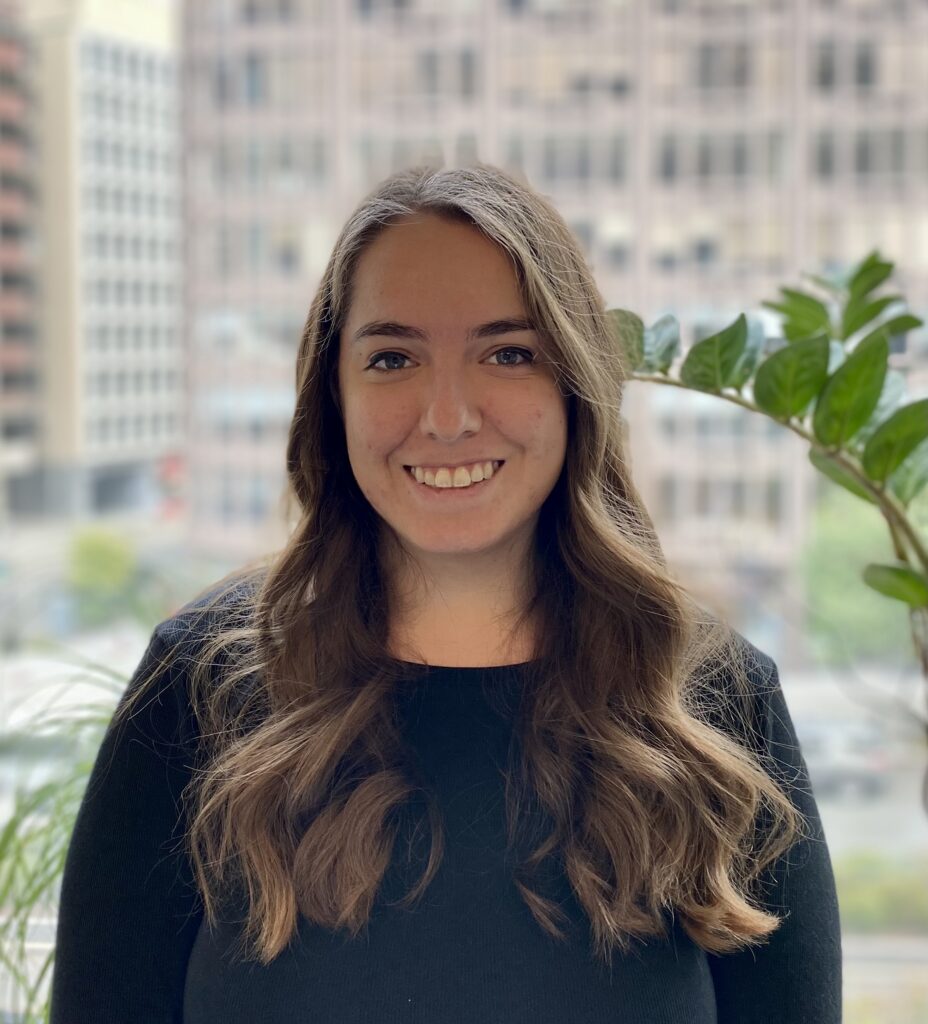
Neither a global pandemic nor an Ebola outbreak could stop Mary Thibodeau from studying abroad. As an alum of both SIT Rwanda and SIT’s global MA in Humanitarian Assistance and Crisis Management, her study abroad journey has been one of unexpected developments that ultimately shaped her into the global citizen she is today.
According to Mary, when it came to studying abroad, it was “always Rwanda.” Passionate about international studies and peacebuilding, she conducted a three-year research project on the impacts of reconciliation programs in schools and communities in post-genocide Rwanda while an undergrad. This was on top of a packed schedule at Elon University, where as an undergraduate, Mary was double majoring in political science with a concentration in international studies and international and global studies with a concentration in Africa.
In January 2020, she was accepted to SIT’s post-genocide restoration and peacebuilding program in Rwanda.
Then came the Covid-19 pandemic. International travel halted, and SIT stopped its programming to keep students safe. Mary was finally able to go to Rwanda in the fall of 2020.
Study abroad prepared me to expect the unexpected.
Despite the social distancing and masking, SIT maintained its commitment to experiential learning.
For Mary, it was particularly impactful to not just read articles but to meet real people with stories to tell while witnessing the great measures taken to maintain peace in Rwanda after genocide.
“What SIT did was bring people from the community to our classroom, which was great. Just getting to talk to people one-on-one was really interesting, even when the topic of genocide was so sensitive,” Mary said. “That was such a valuable experience because reading something is one thing, but getting to actually talk to people is so important. That experience honed my desire to work in this field and say, ‘Okay, I’m gonna do this.’”
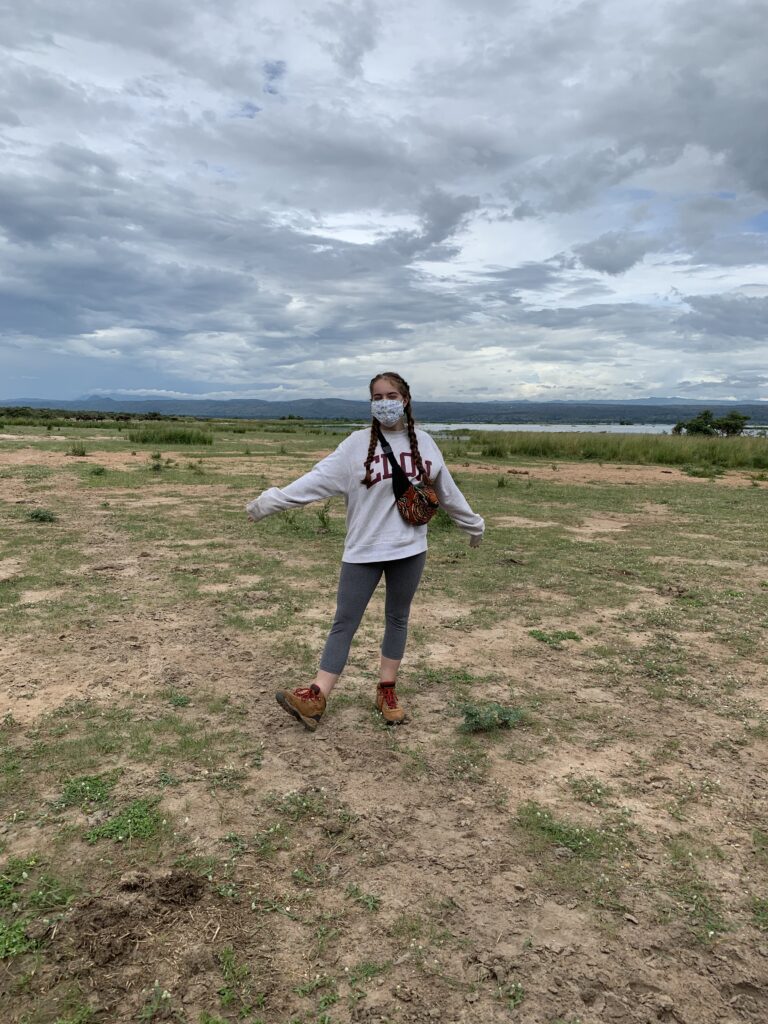
Aligning with her ongoing research at Elon University, Mary conducted research about locally led justice processes in Rwanda for her Independent Study Project (ISP) with SIT. These Gacaca courts, as they were called, played a primary role in bringing peace to the country after the genocide.
She was struck by the disparity between scholarly research written by mostly white, Western men about the failures of those local peace processes versus what she saw and heard from the people who went through it.
“Every person we talked to up to that point talked about how successful the justice program was, how it wasn’t a Western judicial process, but it was an African-style judicial process,” she said. “So, my research focused on the actual perspectives of people who went through the genocide and then the Gacaca courts.”
Mary met with both survivors and perpetrators of the genocide, as well as judges and community members, to ensure all voices were heard. At the end of almost every interview, each interviewee asked that their stories be shared to help correct misconceptions about Rwanda and emphasize how far they’ve come.
Mary said SIT took great measures to ensure that every student’s mental health was taken care of. To balance the heavy nature of the topics they discussed, they also had lighter experiences, such as making their own coffee from Rwandan coffee bean fields.
It was an experience that she described as “incredible,” and made for a true launching pad into the next phase of her academic and professional career. After graduating, she went looking for graduate programs that emphasized on-the-ground international experience and came across SIT’s global master’s in humanitarian assistance and crisis management.

She was enticed by the program’s travel to multiple countries, which was originally intended to be Jordan and Uganda. But after she was accepted, an Ebola outbreak hit Uganda forcing SIT to reshape the program. Mary saw this as a great example of how international practitioners often have to think on their feet and change course unexpectedly.
“Our professors emphasized that this was just a common element of crisis management and that we have to get used to not knowing things because when there’s a crisis, you won’t always know where you’re going,” she said. “It was almost like real-life practice for our future jobs.”
The program took Mary’s cohort to Jordan, Turkey, and Serbia, which allowed her to compare what she had just experienced in Rwanda with that in Bosnia and Herzegovina, also a post-genocide society.
The opportunities to be abroad and to meet people in the field, especially through SIT’s master’s programs, are genuinely preparing you for the job.
The curriculum included a semester where students could choose their own country. As a French speaker, Mary chose Morocco. While there, she worked full-time for a refugee organization in their grants department and assisted with workshops amongst African refugee service providers.
Concurrently, she completed her thesis, which reviewed Tanzanian and international organizations’ water and sanitation policies through a decolonized perspective and was later published.
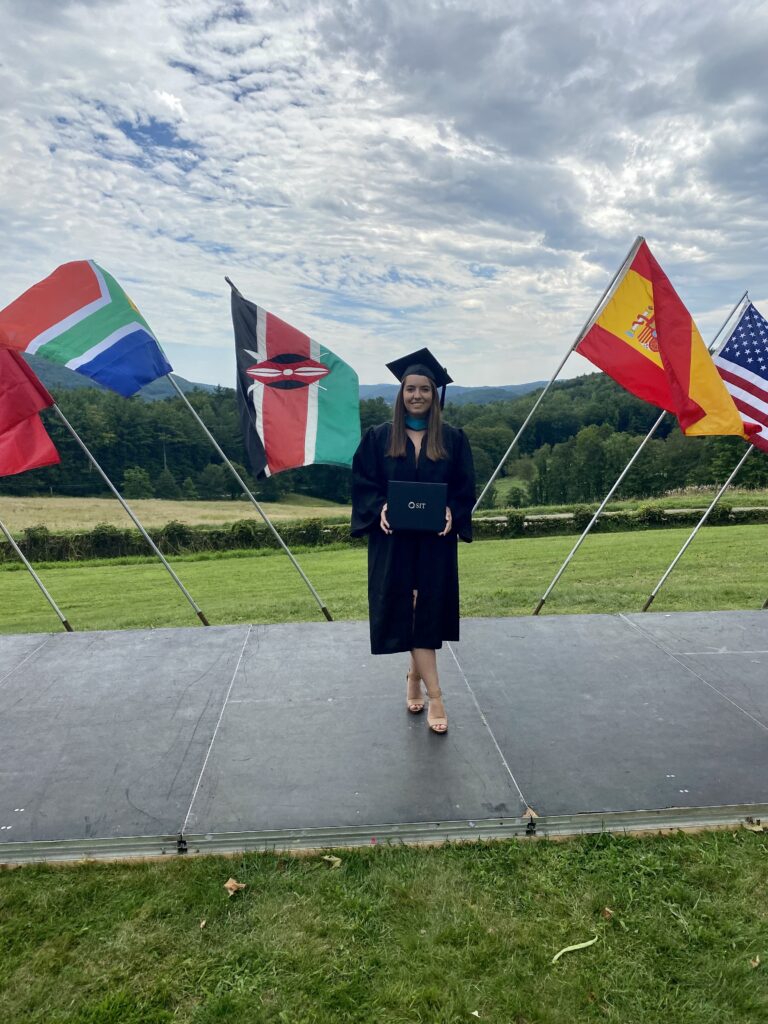
After graduating from the MA program in August 2023, she quickly began her current role as a program associate at the American Bar Association Rule of Law Initiative in the Africa division. There, she says every day is an opportunity to draw upon both of her study abroad experiences.
“The opportunities to be abroad and to meet people in the field, especially through SIT’s master’s programs, are genuinely preparing you for the job,” she said. “For example, at SIT, we had classes on writing proposals, and I have directly used that work when I’ve been working on proposals for my job. SIT just really prepares you for the actual work.”
Mary is also still in touch with her homestay family from Jordan and receives a text from her homestay neighbor almost every day.
As each of her programs shifted gears, Mary learned how to think and act on her feet and was equipped with the hard skills used in her everyday work, ultimately shaping her as a researcher, practitioner, and global citizen. “Study abroad prepared me to expect the unexpected,” she said. “I 100 percent recommend it to anyone who’s considering it.”
Barduhn is one of three SIT TESOL professors in prestigious U.S. State Department program
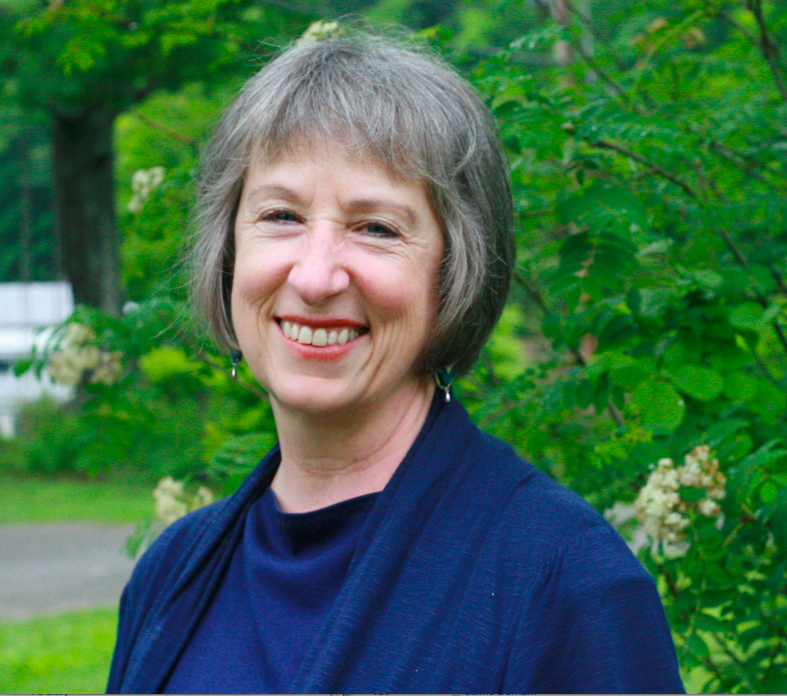
Dr. Susan Barduhn, professor emerita of SIT Graduate Institute in Vermont, was selected by the U.S. State Department for a two-week English Language Specialist project focusing on professional development for English teachers at three universities in Turkey. She also gave the opening plenary speech at the TESOL Turkey conference in Eskişehir.
Dr. Barduhn’s project is one of just 130 that the English Language Specialist Program supports each year. The program is considered the premier opportunity for leaders in the field of teaching English to speakers of other languages (TESOL) to enact meaningful and sustainable changes in the way that English is taught abroad. SIT TESOL Professor Dr. Elka Todeva and Professor Emerita Elizabeth Tannenbam are also EL Specialists.
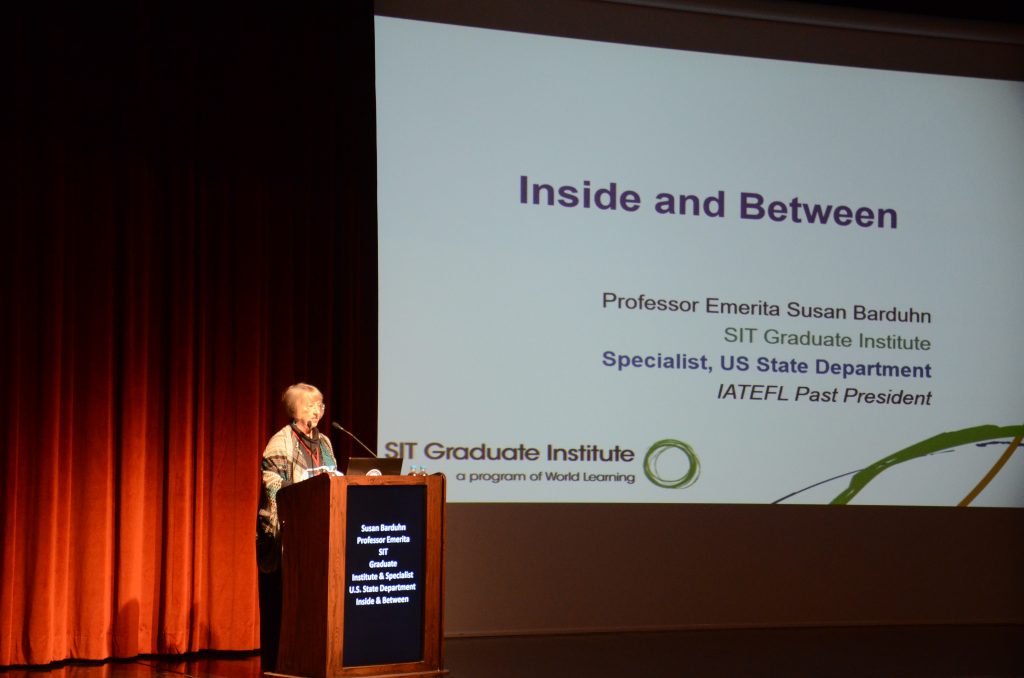
Dr. Barduhn has had an extensive career supporting, supervising, advising and training teachers. She taught English in Colombia, Portugal, and Spain, then spent eight years in Kenya creating and directing the first language institute in sub-Saharan Africa, followed by 15 years in London, before returning to the United States as a professor and chair in the MA TESOL department at SIT Graduate Institute.
She is past resident of IATEFL (International Association of Teachers of English as a Foreign Language), and currently an educational consultant for Consultants-e and TransformELT, among others. In addition to English Language Specialist for the U.S. State Department, she is a Fulbright Specialist, a consultant for the British Council, and an SIT TESOL Certificate trainer of trainers. She is also a member of the World Learning Global Advisory Council. A published author and acclaimed public speaker, she is frequently invited to give keynote addresses at conferences around the world.
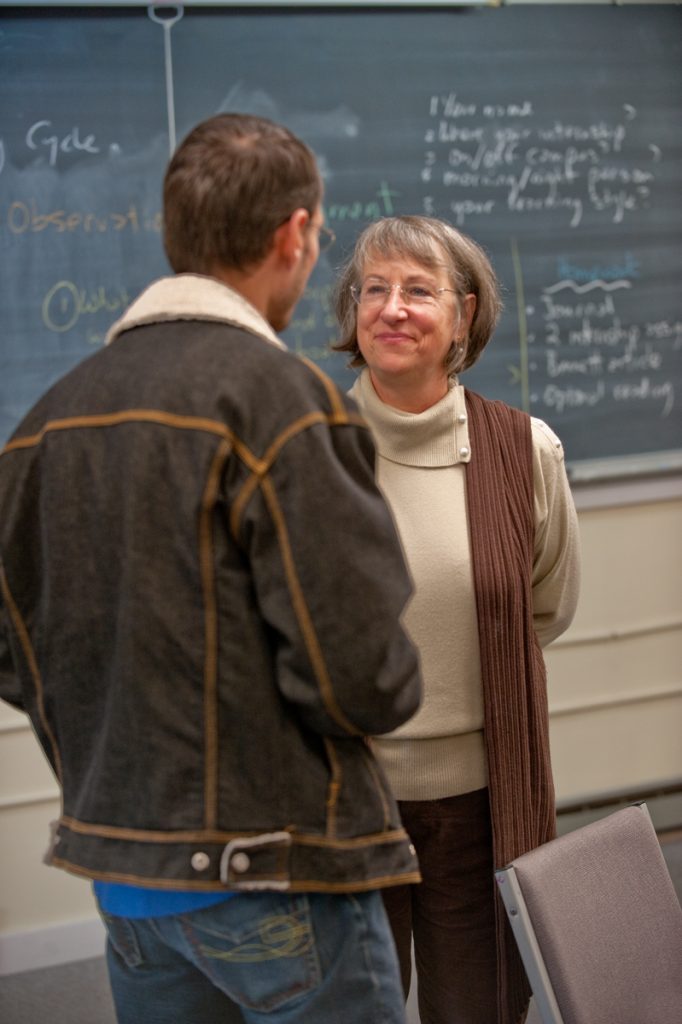
Through projects developed by U.S. embassies in more than 80 countries, EL Specialists work directly with local teacher trainers, educational leaders, and education ministry officials to exchange knowledge, build capacity, and establish partnerships benefiting participants, institutions, and communities in the United States and overseas.
Dr. Barduhn’s most recent project took place at three major state university prep programs in Turkey: Uludağ University in Bursa, Yildirim Beyazit University in Ankara, and Osmangazi University in Eskişehir, which received hands-on training from Dr. Barduhn. At the conclusion of each two-day visit, administrators were better informed about how to support their university’s Continuing Professional Development Unit (CPDU); teaching staff were more familiar with the importance of CPDU and felt less trepidation about playing an active role in their own program’s CPDU; and CPDU staff were exposed to a range of CPDU models and began analyzing and revamping their own CPDU.
Since 1991, the English Language Specialist Program has sent hundreds of TESOL scholars and educators abroad to promote English language learning, enhance English teaching capacity, and foster mutual understanding between the U.S. and other countries through cultural exchange. On assignment, EL Specialists may conduct intensive teacher training, advise ministries of education or participate in high-level educational consultations, and offer plenary presentations at regional, national or international TESOL conferences. These projects are challenging and those selected represent the best of the U.S. TESOL community. In return, the program provides professional development opportunities to help participants experience different cultures and build skills that can greatly enhance their TESOL careers back home.
English Language Specialists are counted among the more than 50,000 individuals participating in U.S. State Department exchange programs each year.
Last month, SIT Graduate Institute and it’s TESOL MA program received an award from the State Department as the institution that has produced the most participants for the English Language Fellows program.
Visit the SIT Graduate Institute website for more information about the SIT TESOL program
For more information about the English Language Specialist Program visit elprograms.org/specialist; call 202-632-6452; or e-mail [email protected].
